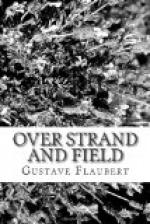I can see him leaning over the side of the ship, I can see him looking for a new world and weeping over the country he has left. He lands; he listens to the waterfalls and the songs of the Natchez; he watches the flowing rivers and the bright scales of the snakes and the eyes of the savages. He allows his soul to be fascinated by the languor of the Savannah. They tell each other of their native melancholy and he exhausts its pleasures as he exhausted those of love. He returns, writes, and everyone is carried away by the charm of his magnificent style with its royal sweep and its supple, coloured, undulating phrase, as stormy as the winds that sweep over virgin forests, as brilliant as the neck of a humming-bird, and as soft as the light of the moon shining through the windows of a chapel.
He travels again; this time he goes to ancient shores; he sits down at Thermoplyae and cries: Leonidas! Leonidas! visits the tomb of Achilles, Lacedaemon, and Carthage, and, like the sleepy shepherd who raises his head to watch the passing caravans, all those great places awake when he passes through them.
Banished, exiled, laden with honours, this man who had starved in the streets will dine at the table of kings; he will be an ambassador and a minister, will try to save the tottering monarchy, and after seeing the ruin of all his beliefs, he will witness his own glorification as if he were already counted among the dead.
Born during the decline of one period and at the dawn of another, he was to be its transition and the guardian of its memories and hopes. He was the embalmer of Catholicism and the proclaimer of liberty. Although he was a man of old traditions and illusions, he was constitutional in politics and revolutionary in literature. Religious by instinct and education, it is he, who, in advance of everyone else, in advance of Byron, gave vent to the most savage pride and frightful despair.
He was an artist, and had this in common with the artists of the eighteenth century: he was always hampered by narrow laws which, however, were always broken by the power of his genius. As a man, he shared the misery of his fellow-men of the nineteenth century. He had the same turbulent preoccupations and futile gravity. Not satisfied with being great, he wished to appear grandiose, and it seems that this conceited mania did not in the least efface his real grandeur. He certainly does not belong to the race of dreamers who have made no incursion into life, masters with calm brows who have had neither period, nor country nor family. But this man cannot be separated from the passions of his time; they made him what he was, and he in turn created a number of them. Perhaps the future will not give him credit for his heroic stubbornness and no doubt it will be the episodes of his books that will immortalise their titles with the names of the causes they upheld.
I stayed at the window enjoying the night and feeling with delight the cold morning air on my lids. Little by little the day dawned; the wick of the candle grew longer and longer and its flame slowly faded away. The roof of the market appeared in the distance and a cock crowed; the storm had passed; a few drops of water remained in the dust of the road and made large round spots on it. As I was very tired, I went back to bed and slept.




